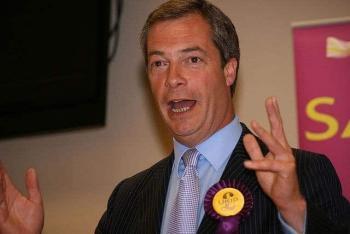 Let me get this straight right at the beginning. I believe that Nigel Farage, the leader of the United Kingdom Independence Party, frequently talks nonsense. His party’s policies seem to be made up on the spot and his relentless focus on immigration is a divisive force sending Britain backwards not forwards. As you may gather, I do not sympathise with his views one bit.
Let me get this straight right at the beginning. I believe that Nigel Farage, the leader of the United Kingdom Independence Party, frequently talks nonsense. His party’s policies seem to be made up on the spot and his relentless focus on immigration is a divisive force sending Britain backwards not forwards. As you may gather, I do not sympathise with his views one bit.
Yet, here in the UK, the local council elections yesterday showed that many people do believe in him and UKIP. Indeed, the party has gained 89 seats throughout England, where the coalition government parties, so far, have lost 200 seats between them. Clearly, many people prefer UKIP to the Government.
The majority of people, of course, do not support Nigel Farage. The vast bulk of the voters did not support UKIP; three-quarters of people voted for other parties.
Yet, whatever you think of him and his policies, you have to admit he is causing something of a disturbance. But why?
Discussions on radio and TV and in newspaper columns have revealed a common thread when talking to the public. You cannot misunderstand what Nigel Farage thinks. He is clear and passionate about his policies. He relentlessly bashes home his view and like it or not, you know what it is.
But interviews with voters have also revealed what they think of other politicians. They are unsure what they actually stand for and even though they support the party, they wish the leaders would spend more time saying what they really believe in and less time preparing “spin” and saying what they think the public wants to hear. Indeed, this was a point picked up by Liberal Democrat minister, Lynne Featherstone, when she told the BBC that politicians need to be “more human”.
When you think of politicians you understand – even though you may not support their views – you probably think of people like Boris Johnson, Ann Widdicombe, or Tony Benn. You could not mistake their beliefs, or their passion and towing the party-line is clearly not for them.
Yet, most of our politicians these days are career politicians, often with a degree in politics and with no experience outside politics. They live in a political bubble, unfettered by real-world knowledge.
And that too is the problem for many businesses. At a dinner with some leading fashion experts the other night, the conversation got round to the woes of M&S, which recently reported its third year of losses. The industry leaders I was with were unanimous in one thing: M&S is in a bubble, disconnected from its customers. Even though the company has reported a significant rise in online sales, a major rise of something small in comparison to other retailers is still something small.
Whenever you find a business in some kind of trouble, you can generally find that they had lost sight of what their customers wanted. Instead, they delivered what they thought their customers wanted and tried pandering to these theoretical positions. Meanwhile, you can usually find people from these troubled firms who come clean after a while and say what they actually believe, rather than “PR spin”. Indeed, research on trust and credibility of business leaders shows consistently that we prefer those who speak from the heart and not from the head. We like them to be honest, to say what they feel – and not say what they have been told to say by some wet-behind-the-ears graduate of PR.
Internet marketers fall into the same trap. They say what they think we want to hear – “here’s how you can live like me, working from the beach just one hour a week”. But the Internet Marketers, like Pat Flynn, who are completely honest about their online earnings and the way they do business, get a huge following.
So what does all this tell us? It shows that when your online marketing is focused on what you think people want to hear, not saying what you believe, you lose trust and credibility. When you operate like a “business” and not like a human being, you create distance and lack of connection.
Nigel Farage may be someone whose policies and activities I dislike intensely, but you have to hand it to him that he has demonstrated that if you say what you believe, rather than what you think people want to hear, you start connecting. Online it is just the same; understand your customers, sure, but they also need to understand you and if you hide away behind some PR veneer, they cannot “get” what it is your business stands for.

